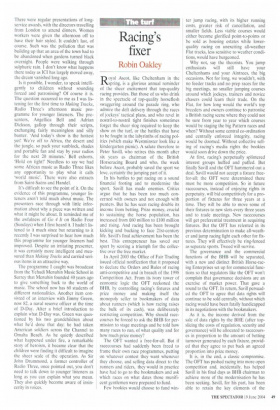Utopian vision
Michael Vestey
Asense of belonging and job security, particularly after a slump, must have attracted people to places such as Billingham on Teesside in the 1920s and 1930s as in other respects they seem narrow, restricted and ugly towns. Billingham was the company town of Imperial Chemical Industries. The firm not only built its factories there but also provided the houses for its workers, even naming streets, choirs and football teams after its chemical processes: Ammonia Avenue, Nitrates Avenue and so on. The fact that the new houses also had bathrooms was also praised at the time.
After listening to Brave New Billingham on Radio Four last week (Monday), presented by Chris Bowlby, the whole notion seemed even stranger. The title is a play on Aldous Huxley's Brave New World as the town appears to have inspired him. He visited Billingham and saw a Utopian vision. The town was, he observed, 'a vast cooperative work of art'. He saw, too, the exciting new materials of the consumer age: fertiliser, plastics, nylon, petrol and even nuclear materials, an enlightened place and a model for the future. One of Huxley's characters is called Mond, the same surname as Alfred Mond, who created ICI. He thought capitalism was the best antidote to socialism and he also provided 'cradle-to-the-grave' welfare benefits.
Some recalled how ICI dominated everything: there was little escape, though once you got in there you would survive. There were regular presentations of longservice awards, with the directors travelling from London to attend dinners. Women workers were given the afternoon off to have their hair styled. It couldn't last, of course. Such was the pollution that was building up that an area of the town had to be abandoned when gardens turned black overnight. People were walking through sulphuric rain. I don't know what happens there today as ICI has largely moved away, the dream vanished long ago.
Is it possible, I wonder, to speak intelligently to children without sounding forced and patronising? Of course it is. The question occurred to me as I was listening for the first time to Making Tracks, Radio Three's afternoon music programme for younger listeners. The presenters, Angellica Bell and Adrian Dickson, gallop through their scripts, exchanging fairly meaningless and silly banter. 'And today's show is the hottest yet! Were off to Africa, the desert and the jungle, so pack your sunblock, shades and portable fan and stay by your radios for the next 20 minutes.' Bell exhorts, 'Hold on tight!' Needless to say we had some African music as Radio Three likes any opportunity to play what it calls 'world music'. There were also extracts from Saint-Saens and Handel.
It's difficult to see the point of it. On the evidence of this programme, younger listeners aren't told much about music. The presenters race through with little information about why a piece was written and what it might be about. It reminded me of the awfulness of Go 4 It on Radio Four (Sundays) when I first heard it. I hadn't listened to it much since but returning to it recently I was surprised to hear how much this programme for younger listeners had improved. Despite an irritating presenter, it was certainly more intelligent and measured than Making Tracks and carried serious items in an attractive way.
The programme I caught was broadcast from the Yehudi Menuhin Music School in Surrey that Menuhin founded 40 years ago to give something back to the world of music. The school now has 60 students of different nationalities. Another item consisted of an interview with Jimmy Green, now 82, a naval reserve officer at the time of D-Day. After a brief introduction to explain what D-Day was. Green was questioned by his two grandchildren about what he'd done that day: he had taken American soldiers across the Channel to Omaha Beach. As he quietly described what happened under fire, a remarkable story of heroism, it became clear that the children were finding it difficult to imagine the sheer scale of the operation. As Sir John Drummond, a former controller of Radio Three, once pointed out, you don't need to talk down to younger listeners as long as you can explain what you mean. They also quickly become aware of insincerity in voices.



































































 Previous page
Previous page